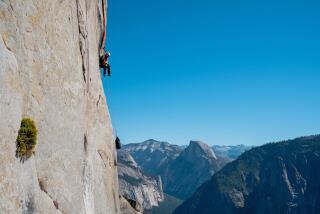Grateful Climber Describes His Amputation Ordeal
- Share via
The mountaineer who amputated his right forearm when it became trapped under a boulder in a remote Utah canyon described Thursday how he had to snap the forearm bones before cutting into his flesh with a dull knife.
At a news conference in Grand Junction, Colo., 27-year-old Aron Ralston detailed the events leading up to the amputation and how he was then able to rappel down a steep cliff and walk to within two miles of his car before being spotted by a rescue helicopter. Until Thursday, a week after his rescue, Ralston had been shielded from the media by his parents while he regained his strength.
With his mother beside him and his injured arm in a sling, Ralston first thanked the millions of people who had kept him in their thoughts. He also said doctors told him that he would have lost the arm anyway because the 800-pound boulder had cut off the blood and caused severe soft-tissue damage.
“It occurred to me I could break my bones,” said a composed Ralston, who underwent surgery Monday to facilitate the fitting of a prosthesis. “I was able to first snap the radius and then within another few minutes snap the ulna at the wrist and from there, I had the knife out and applied the tourniquet and went to task. It was a process that took about an hour.”
Ralston, whose five-day ordeal thrust him into the national limelight, then added new details about what happened in the steep, winding canyon just outside Canyonlands National Park in southeastern Utah.
Leaving his truck in a parking lot, Ralston first rode his mountain bike about 15 miles cross-country, locking it to a tree at the head of the canyon. For the first leg of the climb, Ralston said he walked with two young women before taking on the tougher part of the canyon. He said he became trapped when he came upon three large boulders wedged in the 3-foot wide canyon that he had to climb over. The second boulder rolled as he tried to scramble over it, trapping his right hand against the wall.
From there, it was five days of frustration as he tried to find a way out of his dilemma. First, he said, he tried to chip away at the boulder and cliff wall with his cheap, multitool knife, which he described as “what you’d get if you bought a $15 flashlight and got a free multiuse tool.” When that didn’t work, he tried to rig up a way to lift the boulder using his climbing gear. But that, too, did not work. “At no point was I ever able to get that boulder to budge even microscopically,” he said.
Ralston said that at first his adrenaline was flowing as he attempted to free his hand, then he realized he had to calm down and concentrate on solving the potentially deadly problem. As the days went by, he felt depression and remorse as well. He told reporters he regretted not leaving a note about where he was going, likening it to when an auto accident occurs the one time the driver isn’t wearing a seat belt.
“This is something I almost always do, but I failed to do this time,” he said.
On the third day, with his food and water gone and no hope for rescue in sight, Ralston made the drastic decision to cut off his arm. But when he tried to cut his arm, the pocketknife was so dull he couldn’t break the skin.
On the fourth day he determined that the only recourse was to snap the bones, and on the fifth day he summoned the nerve to perform the operation, applying a tourniquet using his biking shorts for padding. He said the amputation and bandaging took about an hour. Ralston said he was simply being pragmatic.
“I felt pain and I coped with it,” he said.
From there, he crawled through the canyon, then rigged his ropes and rappelled 60 feet to the base of the cliff, a technique that usually requires two hands. And then he began hiking out of the desert, heading for his car. A Dutch couple and their son found him about the time a rescue helicopter came into view.
When Ralston entered the room where the news conference was being held, he took pictures of the assembled gathering.
“These are for me,” said Ralston, who quit his engineering job in Albuquerque last year and moved to Aspen, Colo., to devote his time to the outdoors.
He also said he was looking forward to leaving the hospital and returning to the outdoors.
And one other thing: “I’m looking forward to a giant margarita.”
More to Read
Sign up for Essential California
The most important California stories and recommendations in your inbox every morning.
You may occasionally receive promotional content from the Los Angeles Times.













